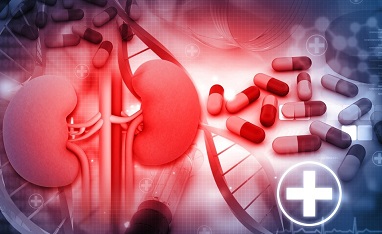Drug News - Medications - Kidneys Apr 04, 2023 2 years, 8 months, 1 week, 4 days, 18 hours, 13 minutes ago
Everyday medications found in your cabinet could be silently damaging your kidneys. Surprisingly, 20% of kidney damage results from both prescription and over-the-counter (OTC) medications. This alarming statistic raises concerns, especially considering 1 in 3 people in the U.S. are at risk for kidney disease.
https://www.aafp.org/pubs/afp/issues/2008/0915/p743.html#afp20080915p743-b1
https://www.kidney.org/news/newsroom/fsindex
Some of these prescribed or OTC everyday
medications could harm your kidneys if taken too often or at high doses.

Medications that can harm kidneys include common ones like antibiotics, blood pressure drugs, non-steroidal anti-inflammatory drugs (NSAIDs), proton pump inhibitors (PPIs), and even some supplements.
Some people are at higher risk of kidney damage from these medications including those who are over 60 years of age or who are living with chronic conditions like diabetes, high blood pressure, and lupis nephritis.
NSAIDs are among the most common culprits of drug-induced kidney disease. Long-term use can lead to chronic kidney disease (CKD). Some of these NSAIDs include aspirin (Bayer, Ecotrin), ibuprofen (Advil, Motrin), and naproxen (Aleve, Naprosyn). These medications are among the most common culprits of drug-induced kidney disease in which long-term use can lead to chronic kidney disease (CKD). These medicines should never be taken every day or often without consultation with a licensed medical doctor.
Some antibiotics, like penicillin and cephalosporins, if used incorrectly, can also cause acute kidney issues.
Aminoglycoside antibiotics are known for causing kidney injury…even at low doses! Individual with chronic kidney disease, dehydration, or those who have been taking these antibiotics for a long time are at particularly high risk. The most nephrotoxic aminoglycoside is neomycin, followed by gentamicin, tobramycin, and amikacin. Streptomycin is the least toxic. Although these medications are typically used in hospitals, they are important to keep at the back of your mind!
PPIs, while having a low overall risk for kidney injury, have been found to increase the chance of kidney disease with long-term use and sustained higher doses. PPIs, such as omeprazole (Prilosec) and lansoprazole (Prevacid), help reduce stomach acid and are among the most commonly prescribed medications.
While they have a low overall risk for kidney injury, long-term use and sustained higher doses have been found to increase the chance of kidney disease.
Blood pressure medications, like angiotensin-converting enzyme inhibitors (ACEIs) and angiotensin receptor blockers (ARBs), are effective at controlling blood pressure but can pose risks when combined with other medications harmful to kidneys. Some common ACEIs include benazepril (Lotensin), enalapril (Vasotec), and lisinopril (Prinivil, Zestril). Common ARBs include azilsartan (Edarbi), candesartan (Atacand), and irbesartan (Avapro).
Supplements can also affect kidney function. Herbal supplements, especially those con
taining aristolochic acid, have been linked to chronic kidney injury.
Psychiatric medications, such as Prozac (fluoxetine) and mood stabilizers like lithium and Elavil (amitriptyline), can cause muscle breakdown, leading to kidney damage.
Overuse of pain medications can cause up to 5% of chronic kidney failure cases each year.
Diuretics also known as water pills, to treat high blood pressure and some kinds of swelling. They help your body get rid of extra fluid. But they can sometimes dehydrate you, which can be bad for your kidneys. Popular diuretics include hydrochlorothiazide, furosemide, and spironolactone.
Laxatives can leave crystals in your kidneys that may damage them or cause failure, especially ones containing oral sodium phosphate (OSP).
Iodinated radiocontrast which contrast dyes used in diagnostic testing, such as a CT scan are one of the most common causes of kidney injury among hospitalized patients, occurring within 24 to 48 hours after receiving an IV contrast injection.
A diabetes medication like Jardiance that is supposed to protect the kidneys in patients with diabetes but has also been reported in rare cases to cause kidney failure. Importantly, Jardiance has diuretic effects and interacts with other nephrotoxic drugs (drugs on this list), raising the risk for toxic kidney effects.
Certain antiviral HIV medications are linked to long-term kidney damage and can increase your risk for kidney disease. Viread (tenofovir) and Reyataz (atazanavir) have both been shown to cause acute kidney injury.
Zoledronic acid (Zometa, Reclast) is typically used to treat osteoporosis but is a known cause of kidney damage and renal failure. Zometa is an important IV medication for treating metastatic bone cancer, but does come with a well-known potential to impair kidney function.
Foscarnet, also given by IV, is a rarely used drug that treats viral infections in patients with weakened immune systems. It can be highly toxic to the kidneys, so if you need it, your doctor will closely monitor your kidney function.
In addition to these medications, people with kidney disease should be cautious about taking cholesterol or diabetes medications, antacid medicine for an upset stomach, or antimicrobial medications like antifungal and antiviral drugs. In some cases, a smaller, safer dose may be possible.
It should be noted that in this current COVID-19 era, may Post-COVID individuasl have kidney damage or injuries without even knowing it . (Refer to search function on TMN to find more than 63 studies supporting this!)
To prevent drug-induced kidney disease, it is crucial to keep an updated list of OTC and prescription medications and supplements that one takes. Ask your doctor about potential interferences with your kidneys and possible issues when taking new medications. Stay hydrated, maintain a reduced salt diet, and exercise daily to control blood pressure and reduce the risks of kidney injury.
If kidney damage is due to medication, discontinuing the medication, replacing fluids, and treating kidney inflammation are ways to treat it under the guidance of a physician. By staying informed and vigilant about the medications you take, you can minimize the risk of kidney damage and protect your overall health.
For about
Kidney Damage And Medications, keep on logging to Thailand Medical News.
Read Also:
https://www.thailandmedical.news/news/first-published-case-report-links-usage-of-molnupiravir-to-treat-covid-19-to-acute-renal-failure
